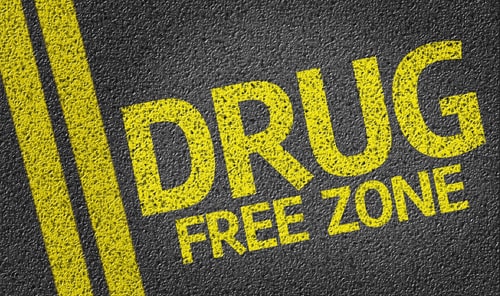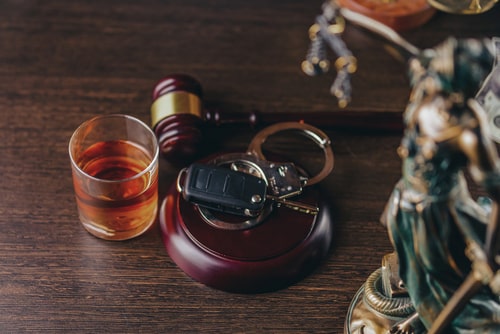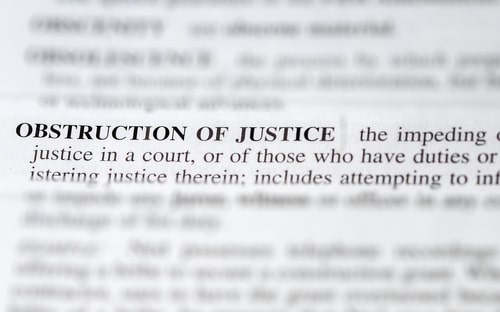“I couldn't ask for a better attorney, and office to work with.”-Satisfied Client
Recent Blog Posts
The "Drug-Free Zone" Enhancement Explained
 If a drug crime involved certain circumstances that make the offense more serious, a sentencing enhancement might apply. A sentencing enhancement means that you will serve a longer or harsher sentence. One common sentencing enhancement in drug crimes involves drug-free zones. If a drug crime was committed in a place the law considers a designated drug-free zone, you could face additional jail time. Drug-free zones are usually places where children would congregate. This sentencing enhancement is meant to discourage drug users and dealers from bringing drugs into places where children are likely to be present. If you have been accused of committing a drug-related offense in a drug-free zone, you need an experienced Houston, TX drug crimes lawyer to defend you.
If a drug crime involved certain circumstances that make the offense more serious, a sentencing enhancement might apply. A sentencing enhancement means that you will serve a longer or harsher sentence. One common sentencing enhancement in drug crimes involves drug-free zones. If a drug crime was committed in a place the law considers a designated drug-free zone, you could face additional jail time. Drug-free zones are usually places where children would congregate. This sentencing enhancement is meant to discourage drug users and dealers from bringing drugs into places where children are likely to be present. If you have been accused of committing a drug-related offense in a drug-free zone, you need an experienced Houston, TX drug crimes lawyer to defend you.
What Are Drug-Free Zones?
Texas law designates certain types of places as drug-free zones. The creation of drug-free zones was meant to protect children from witnessing drug crime or being influenced to try drugs by unscrupulous dealers. You may recall from an anti-drug presentation you saw in school as a youth the stereotypical image of a drug dealer lurking on a playground offering children free drugs in an effort to get them addicted. This is the type of situation lawmakers were likely contemplating when they created drug-free zones. However, you would be hard-pressed to find an example of a drug dealer behaving this way in real life.
Houston DWI Intoxication Assault FAQs - Part 3
 If you have been charged with the felony offense of intoxication assault after a DWI accident, you need a highly experienced and knowledgeable Houston, TX criminal defense lawyer to help you. Drunk drivers never think that they are going to cause an accident and hurt someone, but it happens all too frequently. Texas’s intoxication assault laws apply to people driving most types of motor vehicles, even if the vehicle in question does not belong on the roads. This is because almost any type of motorized vehicle can cause injury to others if the person operating it is intoxicated.
If you have been charged with the felony offense of intoxication assault after a DWI accident, you need a highly experienced and knowledgeable Houston, TX criminal defense lawyer to help you. Drunk drivers never think that they are going to cause an accident and hurt someone, but it happens all too frequently. Texas’s intoxication assault laws apply to people driving most types of motor vehicles, even if the vehicle in question does not belong on the roads. This is because almost any type of motorized vehicle can cause injury to others if the person operating it is intoxicated.
What Counts as a Motor Vehicle for Intoxication Assault?
More vehicles count as motor vehicles for purposes of an intoxication assault charge than you might think. For purposes of the intoxication assault crime and other DWI crimes, Texas Penal Code Section 49.01(3) defines a motor vehicle as having "the meaning assigned by Section 32.34(a)." Texas Penal Code Section 32.34(a) defines a motor vehicle as "a device in, on, or by which a person or property is or may be transported or drawn on a highway, except a device used exclusively on stationary rails or tracks."
Houston DWI Intoxication Assault FAQs - Part 2
 Intoxication assault is a felony offense in Houston. The most common type of intoxication assault is when a drunk driver causes an accident and injures someone. This crime is far more serious than a simple DWI. If you are charged with intoxication assault, you could face more than a year in prison if you are convicted. It is important to have a well-qualified Houston, TX intoxication assault attorney defending your rights.
Intoxication assault is a felony offense in Houston. The most common type of intoxication assault is when a drunk driver causes an accident and injures someone. This crime is far more serious than a simple DWI. If you are charged with intoxication assault, you could face more than a year in prison if you are convicted. It is important to have a well-qualified Houston, TX intoxication assault attorney defending your rights.
Would Slugging Someone Constitute Intoxication Assault?
No. For a prosecutor to charge a defendant with intoxication assault under Texas Penal Code Section 49.07, the defendant must have been operating a motor vehicle or another qualifying piece of equipment (see the next answer). Simply striking another person with a fist while intoxicated would not constitute intoxication assault under Texas Penal Code Section 49.07.
Houston DWI Intoxication Assault FAQs - Part 1
 If someone got hurt, your DWI is probably going to be treated as a felony offense. Our state’s laws against driving while intoxicated are meant to protect the public from being injured by drunk drivers. Although the term "assault" usually means intentionally attacking someone, you do not need to have meant to hurt anyone to get charged with intoxication assault. Most drunk drivers do not intend to cause an accident and truly believe that they will reach their destination safely. If you are up against intoxication assault charges, you need an experienced Houston, TX DWI defense lawyer.
If someone got hurt, your DWI is probably going to be treated as a felony offense. Our state’s laws against driving while intoxicated are meant to protect the public from being injured by drunk drivers. Although the term "assault" usually means intentionally attacking someone, you do not need to have meant to hurt anyone to get charged with intoxication assault. Most drunk drivers do not intend to cause an accident and truly believe that they will reach their destination safely. If you are up against intoxication assault charges, you need an experienced Houston, TX DWI defense lawyer.
What is Intoxication Assault?
Under Texas Penal Code Section 49.07, intoxication assault is the felony crime of causing, by reason of intoxication, the serious bodily injury of another, while operating a motor vehicle in a public place. In plain terms, intoxication assault is what Texas calls the DWI crime when the intoxication causes serious injury to another. If you seriously hurt someone in a DWI motor vehicle accident, you may face an intoxication assault charge.
What is Obstruction of the Federal Justice System?
 Obstruction of justice at the federal level is extremely serious in all its forms. The term "obstruction of justice" is an umbrella term that refers to a lot of different specific offenses. Just like the term "drug crime" might refer to possession of cannabis without a medical license, distribution of cocaine, or trafficking heroin into the country, "obstructing justice" might refer to tampering with a witness, influencing a juror, or a host of other offenses. Generally speaking, obstruction of justice means making any attempt to stop law enforcement or the courts from carrying out their duties in accordance with the law. If you are charged with obstructing justice at the federal level, you need an experienced Houston, TX federal crimes attorney.
Obstruction of justice at the federal level is extremely serious in all its forms. The term "obstruction of justice" is an umbrella term that refers to a lot of different specific offenses. Just like the term "drug crime" might refer to possession of cannabis without a medical license, distribution of cocaine, or trafficking heroin into the country, "obstructing justice" might refer to tampering with a witness, influencing a juror, or a host of other offenses. Generally speaking, obstruction of justice means making any attempt to stop law enforcement or the courts from carrying out their duties in accordance with the law. If you are charged with obstructing justice at the federal level, you need an experienced Houston, TX federal crimes attorney.
DWI With Multiple Child Passengers - Part 7
 A felony DWI charge involving multiple child passengers can sound like a very bad DWI charge. The prosecution's inevitable stance will be that the conduct exposed multiple children to harm, making the crime much more reprehensible than the basic misdemeanor DWI charge. But the same circumstances that make a felony DWI with child passengers charge appear especially reprehensible could, with a skilled Houston, TX DWI defense lawyer’s representation, turn a case more to the defendant's favor. It is possible to defeat this charge entirely, or in some cases, to have it reduced to a misdemeanor DWI.
A felony DWI charge involving multiple child passengers can sound like a very bad DWI charge. The prosecution's inevitable stance will be that the conduct exposed multiple children to harm, making the crime much more reprehensible than the basic misdemeanor DWI charge. But the same circumstances that make a felony DWI with child passengers charge appear especially reprehensible could, with a skilled Houston, TX DWI defense lawyer’s representation, turn a case more to the defendant's favor. It is possible to defeat this charge entirely, or in some cases, to have it reduced to a misdemeanor DWI.
Defense Themes for DWI With Child Passengers Charges
Many DWI arrests occur after the defendant has just left a bar, club, or other social outing. Parents, though, generally transport their children for very different, and arguably much better, reasons. Your DWI arrest with your children may have occurred not coming home from a bar or club but instead on the way to or from school, grocery shopping, medical care, visits with relatives, or other laudable and even important family activities.
DWI With Multiple Child Passengers Part 6
 If you have been charged with a felony DWI for driving intoxicated with multiple child passengers, the stakes are high. You need an experienced DWI attorney to represent you. Texas law and court rules offer several key protective criminal procedures that enable your DWI defense attorney to raise and advocate these defenses. It is not enough to have a defense. Your defense attorney must be skillful and effective in deploying the defense to your best advantage. Criminal procedures determine how, when, and where your Houston, TX DWI lawyer can raise and argue these defenses to gain dismissal of the felony DWI charge, charge reduction, or another advantage.
If you have been charged with a felony DWI for driving intoxicated with multiple child passengers, the stakes are high. You need an experienced DWI attorney to represent you. Texas law and court rules offer several key protective criminal procedures that enable your DWI defense attorney to raise and advocate these defenses. It is not enough to have a defense. Your defense attorney must be skillful and effective in deploying the defense to your best advantage. Criminal procedures determine how, when, and where your Houston, TX DWI lawyer can raise and argue these defenses to gain dismissal of the felony DWI charge, charge reduction, or another advantage.
Protective Procedures for DWI With Child Passengers Charges
Premier Texas DWI defense attorney Doug Murphy may be able to invoke one or more of the following criminal procedures for your effective defense of felony DWI with child passengers charges:
DWI With Multiple Child Passengers Part 5
 Getting arrested does not mean that you will definitely get convicted. You have rights when you have been charged with a crime. You have rights when a police officer pulls you over and while you are in custody. Although getting charged with a felony DWI for carrying multiple child passengers puts you in a precarious legal position, an experienced Houston, TX DWI defense lawyer might find that you have a strong legal defense available.
Getting arrested does not mean that you will definitely get convicted. You have rights when you have been charged with a crime. You have rights when a police officer pulls you over and while you are in custody. Although getting charged with a felony DWI for carrying multiple child passengers puts you in a precarious legal position, an experienced Houston, TX DWI defense lawyer might find that you have a strong legal defense available.
Defending DWI With Child Passenger Charges
Fortunately, you and your retained DWI defense attorney have much you can and should do to fight felony DWI with child passengers charges. Just because you face a felony DWI charge does not mean that the court will convict you of that charge. When you retain a skilled and experienced DWI lawyer for your defense against a DWI with child passengers charge, your attorney may raise and advocate for multiple affirmative defenses to the charge. Prevailing on any one or more of these defenses could result in the prosecution abandoning or reducing the felony DWI charge, the court dismissing the felony DWI charge, or the prosecution offering an acceptable plea bargain.
DWI With Multiple Child Passengers Part 4
 If you have been arrested for a DWI while carrying multiple child passengers, you are in a very serious situation. Not only could you face serious criminal penalties, but if you were driving while intoxicated with your own children in the car, you could also face civil consequences–including having the children removed from your home. Child Protective Services will almost certainly get involved due to mandated reporting laws. The main reason why DWI with a child passenger is automatically a felony charge in Texas is because it is a form of child endangerment, as intoxicated drivers are very likely to get into an accident. Fortunately, there is a lot an experienced Houston, TX felony DWI defense lawyer can do to protect you. Having skilled representation is essential.
If you have been arrested for a DWI while carrying multiple child passengers, you are in a very serious situation. Not only could you face serious criminal penalties, but if you were driving while intoxicated with your own children in the car, you could also face civil consequences–including having the children removed from your home. Child Protective Services will almost certainly get involved due to mandated reporting laws. The main reason why DWI with a child passenger is automatically a felony charge in Texas is because it is a form of child endangerment, as intoxicated drivers are very likely to get into an accident. Fortunately, there is a lot an experienced Houston, TX felony DWI defense lawyer can do to protect you. Having skilled representation is essential.
Child Removal for DWI With Multiple Child Passengers
Removal of the children from the defendant parent's home is an even bigger risk in the case of a DWI charge with multiple child passengers. The felony DWI charge is serious, but the removal of children could be just as serious or more serious as a collateral consequence of the felony charge. Texas's Family Code requires officials who suspect child endangerment or abuse to report the concerns to Child Protective Services. Texas prosecutors construe a DWI charge with child passengers as reportable endangerment under the Family Code.
DWI With Multiple Child Passengers Part 3
 The felony DWI with child passenger charge has the important public policy purpose of protecting child safety. The child need not have suffered any injury to sustain this charge. Serious bodily injury to another due to the intoxicated operation of a motor vehicle in a public place is a separate Texas felony crime called intoxication assault. The policy behind the child passenger DWI crime presumes that the child is at risk of injury or other harm while in a vehicle whose operator is intoxicated. The felony DWI child passenger crime discourages intoxicated drivers from transporting child passengers. Texas's felony DWI child passenger crime is complete with just one child passenger. If you are arrested for DWI while carrying multiple child passengers, you need a Houston, TX felony DWI lawyer to help you. Your situation is serious even if there were no injuries to any of the children.
The felony DWI with child passenger charge has the important public policy purpose of protecting child safety. The child need not have suffered any injury to sustain this charge. Serious bodily injury to another due to the intoxicated operation of a motor vehicle in a public place is a separate Texas felony crime called intoxication assault. The policy behind the child passenger DWI crime presumes that the child is at risk of injury or other harm while in a vehicle whose operator is intoxicated. The felony DWI child passenger crime discourages intoxicated drivers from transporting child passengers. Texas's felony DWI child passenger crime is complete with just one child passenger. If you are arrested for DWI while carrying multiple child passengers, you need a Houston, TX felony DWI lawyer to help you. Your situation is serious even if there were no injuries to any of the children.




 Office Location
Office Location
